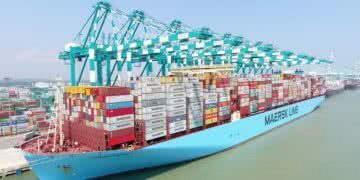From the phone or laptop you are reading this on, to the car you drive, the clothes you wear or the food you eat, most of the goods you use have traveled across the seas.
According to the latest UN assessment, freighters carry 10.7 billion tons of cargo across the oceans every year. Fossil fuels power this industry, which relies on oil, gas and coal shipments to stay in business. In fact, shipping accounts for 2% to 3% of global carbon emissions. This is greater than the emissions produced by all but the world’s five highest-emitting countries.
We need to decarbonize the global shipping industry — we cannot hope to build prosperous sustainable economies without doing so.
Under the UN’s maritime body, the International Maritime Organization, the industry has already committed to cutting emissions by at least 50% by 2050. But the sector will require a deeper and more profound change in the coming decade if it wants to survive.
According to a new report by Maritime Strategies International (MSI), the energy transition away from fossil fuels could hurt shipping companies financially unless they adapt.
MSI predicts the value of all the world’s oil tankers will enter a period of dramatic decline from 2025 onward due to a dramatic collapse in demand for oil and coal, which will lead to greatly reduced need for liquid and dry bulk transportation. That means ships built in 2015 may not be worth more than scrap metal prices in just 10 years’ time.
The first step is recognizing the problem, which is our overwhelming reliance on oil, gas and coal. At the same time, renewable energy sources, such as solar and wind energy, in combination with improved energy efficiency, are already cost-competitive, according to the latest report from the International Renewable Energy Agency (IRENA).
The second step is to ensure the correct fiscal incentives are in place to allow companies and communities to invest in technologies of the future, not the past. The third step is to make sure port cities, private actors and regulators work together to support this transition.
This means pricing pollution by creating a system for taxing emissions to help shift economies from fossil fuels to renewables. It means weaning the oil, gas and coal sectors off what the IMF estimates are $4.7 trillion of annual subsidies and using that money to invest in public services or cut taxes. This has been another clarion call from UN Secretary-General António Guterres: we must stop subsidizing fossil fuels in order to tackle climate change at the scale urgently needed.
It means that the shipping industry must shift investments to zero emission ships and engage with potential suppliers of zero emission fuels to ensure future fuel availability. Those that move the fastest will be the most likely to survive and thrive.
Maersk, the Danish shipping giant, is already showing the path ahead. Last year the company set itself an ambitious target of reaching net-zero emissions by 2050. By working together across the supply chain with port authorities, fuel suppliers, manufacturers and governments, the bold vision of commercially viable zero emission vessels can become a reality by 2030. This is the level of ambition we need to see across industries.
Decarbonizing the global shipping industry will provide tremendous synergy with national climate action plans around the world. According to a report from the Environmental Defense Fund, a push from the shipping industry to switch to renewable-energy-sourced liquid synthetic fuels could stimulate investment in renewable energy infrastructure of up to $6 trillion worldwide by 2050. Green hydrogen and the electrification of green electricity supply in ports will provide even more options to decarbonize the sector.
The Climate Action Summit will take place this September in New York. It will be a crucial step toward achieving the transition in shipping. UN Secretary-General Guterres has called on political and business leaders to come to New York with plans for how countries, industries and businesses will reduce their emissions and reach net-zero emissions by mid-century.
We cannot afford to wait for natural business cycles to dictate global efforts to limit global temperature rise. Delay means greater climate impact and greater cost. Taking bold actions now means greater opportunities and greater benefits. A key check-in on progress will be at the 2020 United Nations Ocean Conference where we will discuss United Nation’s Sustainable Development Goal 14: Conserve and sustainably use the oceans, seas and marine resources for sustainable development by consensus.
The fleets of the 2030s and 2040s will still roll across our oceans, but they will not be laden with polluting fossil fuels. A safe future involves thriving net-zero emissions and resilient economies connected by green trade routes. But we must decisively change course to arrive at this safe harbor.














